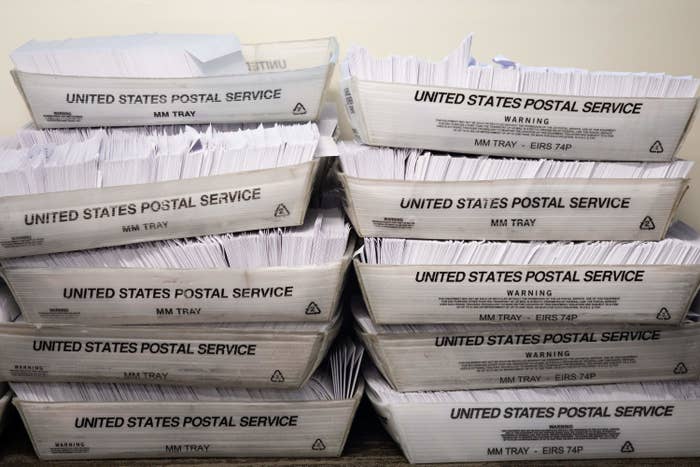
WASHINGTON — Pennsylvania elections officials are scrambling to educate voters on how to properly submit their mail-in ballots after the state Supreme Court ruled officials can reject ballots received without secrecy envelopes.
“You know, it’s very concerning because we can see 30,000 to 40,000 ballots that can very likely be thrown out, just in Philadelphia, in this upcoming general election,” Philadelphia City Commissioner Lisa Deeley told BuzzFeed News during a phone interview Thursday. “And we know in Pennsylvania, you know, after what we saw in 2016, I mean, that could cost an election.”
Last week, the Pennsylvania Supreme Court ruled officials can reject ballots that are not enclosed in a secrecy envelope to conceal how a person voted. This is a reversal from just this summer, when local election officials had instructed counties to count ballots that came in “naked,” or outside of their secrecy envelopes, in June’s elections. Deeley, an elected Democrat, is calling on the state legislature to eliminate the secrecy ballot altogether.
“One voter who is disenfranchised is one too many,” Deeley told BuzzFeed News. “But we are disenfranchising tens of thousands of voters under the cover of law. It isn't fair to Pennsylvanians that their vote will not be counted on a mere technicality, which is really a vestige from the past.”
The court decision has officials and local advocacy groups rushing to do a last-ditch voter outreach campaign on the new rule, just over a month before the presidential election. The result of that outreach could decide the presidency: Donald Trump won Pennsylvania with just 44,292 more votes than Hillary Clinton in 2016.
Deeley said the city commissioners’ office is adding messaging to its communications plan that would advise voters on how to properly submit their mail-in ballot. Since the ruling, the commissioners’ office has added a step-by-step explainer graphic on secrecy envelopes to its website and social media platforms.
The decision adds to an onslaught of confusion for Pennsylvania voters, from the fearmongering around mail-in voting coming out of the White House to the bevy of lawsuits from the Trump campaign that threaten the state’s voting opportunities amid the coronavirus pandemic.
This election marks the first time Pennsylvania voters will widely use mail-in voting options. Pennsylvania Gov. Tom Wolf has pushed mail-in voting as a safe way to vote during the pandemic. Currently, 16 states require a secrecy sleeve to validate mail-in ballots. It’s a measure installed for security and was first adopted by states like Kentucky to avoid voter intimidation.
“The challenge is balancing voter privacy with voter accessibility,” Kentucky’s former secretary of state Trey Grayson told BuzzFeed News. “Right now, groups are sounding the alarm about votes being tossed, but in another context, other groups could sound the alarm about voters losing the secrecy of the ballot.”
But in states like Kentucky, there’s a “cure” option, where, in some cases, voters have an opportunity to either resubmit their ballots, vote in person, or give up their anonymity should their ballots be deemed invalid. The practice, however, requires a longer voting period or rules that allow votes to be counted after Election Day, according to Grayson.
In the meantime, nonprofits are committing to voter outreach around the issue as best they can during a pandemic.
David Thornburgh, president of the Committee of Seventy, a Philadelphia-based good government organization, has held events on Facebook Live, Zoom, and panels that have reached a couple hundred people. But its voter outreach campaign, WeVote, which partners with large businesses like health insurers, could reach a half-million voters, he said.
“At one level, it’s real simple: You’ve got two envelopes, an outer envelope, and you need to use both when you are returning your mail ballot for it to count,” Thornburgh said. “The challenge is, we’ve got 10 or 15 times as many people voting by mail in this election than we did four years ago.”
The ruling has inspired partisan nonprofits to organize. Represent PA, a Philadelphia PAC looking to support more women running in state and federal elections, holds biweekly “breakfast briefings” for women all over Pennsylvania who want to be more engaged in the political process. Executive Director Christine Jacobs said Thursday's event centered around election security and, in light of the recent court ruling, naked ballots.
“All of the Republican discussions are designed around putting restrictions on voting rather than encouraging people to vote,” Jacobs said. “I think that the feeling is the exuberance of making sure that the Democrat votes are held up.”
Jamie Perrapato, who heads Turn PA Blue, called the decision a “form of voter suppression” and said her team is working to combat it, adding language to their voter outreach scripts and planning to share graphics on how to properly submit a ballot. But overall, Perrapato said, this just adds to the anxiety so many people are feeling around voting:
“I just keep yelling: There’s two envelopes; don’t throw anything out!”
